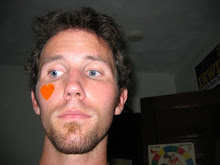I've always wondered about the origin of certain words. 'Cantankerous,' for example. But food words especially arouse the curious feline within. Some are logical: Popcorn, Gumball. But others defy explanation. We've come to accept so many words as normal and obvious when, if made to stop and think about the actual words themselves, they cease to make any sense. This is all well and dandy if we're talking about monolithic search engines or the like: intangible, abstract, invisible at their root, 1s and 0s. When we stuff these nonsensically-named things in our mouths, though, is when I start demanding answers. Or at least a clever story. It's just dawning on me this whole exercise is a very similar concept as those Cheez-It commercials, where the kid explains how they got all that cheese flavor into such a small cracker. Oh well. So, without context nor explanation, I list a few top-'o-the-head edibles that get me wondering...
Lollipop
Marshmallow
Tofu
Cottage (?) Cheese
Barbeque Sauce (okay, it's used on meats grilled over a barbeque... but what the heck-fire is barbeque supposed to mean?)
Toast
Orange Juice (kidding)
Milk
Bagel (I know why it's called a "donut" but the unfried version evades me)
Seasoning (add a touch of fall here, some summer there...)
Um... Meatloaf? No, that makes sense. Cupcake? No, that makes sense, too. Okay, this is harder than I thought. And I realize a lot of the other strange food words (brenois, bouillabaise, burrito, etc.) are loanwords from other languages, or brand-names devised by white-collar types paid to think like ten-year-olds (Twinkee, Snickers, Miracle Whip). So... fine. You win. I detract my argument. You win. Happy? Excuse me while I gorge myself on toast (I get it now) with peanut butter (easy) and jam (yep).
Monday, November 16, 2009
Monday, November 2, 2009
Lobsters hurt. And so do I.
Forget, won't you, the questionable grammar of that title. My point is this: After having re-read David Foster Wallace's essay "Consider the Lobster" for the class I teach, I'm reminded of the extraordinary loss we* experienced last fall when the aforementioned author took his own life. He was 46 years old.
A. J. Liebling, another thinker/humorist/journalist, albeit one with a seemingly happier life than DFW, wrote a vast quantity of his most-beloved books after age 46, included The Sweet Science, The Earl of Louisiana, and Between Meals.
John Updike, prolific and revered, wrote nearly half his oeuvre after his fiftieth birthday: the latter two Rabbit books, eight short-story collections, four books of poetry, both Eastwick novels, seven other novels, and eight collected works of essays and nonfiction.
Joan Didion, still with us, published her vaunted collection The White Album in her forty-fifth year. Two novels and six nonfiction tomes came after, including After Henry, Salvador, and The Year of Magical Thinking.
The exercise could continue. But imagine: All this, erased, never put down on the page. Others would have filled those lines, somehow. I can't believe they would have matched the energy and vigor with which these writers continued to document their surroundings. Maybe this is a fruitless thought-drama: "Take away Shakespeare, and.... go!" Maybe I'm holding up DFW to unfairly high standards, to peers in higher echelons. I don't think so. But it makes me slightly ill to predict what the guy might have conjured up as his acerbic and athletic mind grew sharper with age. And that's what hurts the most: We have no idea what these conjurings might have been. We will never know.
----
*"we" = readers, eaters, state-fair attendees, cruise-ship travelers, tennis players, mathematicians, Lynch devotees, Adult movie watchers, jesters, interviewers, hideous men, Illinoisians, Pomona grads-to-be, those with reactive sweat glands, unpretentious polyglots, bandana-aficionados, i.e., literate and up-right human beings.
A. J. Liebling, another thinker/humorist/journalist, albeit one with a seemingly happier life than DFW, wrote a vast quantity of his most-beloved books after age 46, included The Sweet Science, The Earl of Louisiana, and Between Meals.
John Updike, prolific and revered, wrote nearly half his oeuvre after his fiftieth birthday: the latter two Rabbit books, eight short-story collections, four books of poetry, both Eastwick novels, seven other novels, and eight collected works of essays and nonfiction.
Joan Didion, still with us, published her vaunted collection The White Album in her forty-fifth year. Two novels and six nonfiction tomes came after, including After Henry, Salvador, and The Year of Magical Thinking.
The exercise could continue. But imagine: All this, erased, never put down on the page. Others would have filled those lines, somehow. I can't believe they would have matched the energy and vigor with which these writers continued to document their surroundings. Maybe this is a fruitless thought-drama: "Take away Shakespeare, and.... go!" Maybe I'm holding up DFW to unfairly high standards, to peers in higher echelons. I don't think so. But it makes me slightly ill to predict what the guy might have conjured up as his acerbic and athletic mind grew sharper with age. And that's what hurts the most: We have no idea what these conjurings might have been. We will never know.
----
*"we" = readers, eaters, state-fair attendees, cruise-ship travelers, tennis players, mathematicians, Lynch devotees, Adult movie watchers, jesters, interviewers, hideous men, Illinoisians, Pomona grads-to-be, those with reactive sweat glands, unpretentious polyglots, bandana-aficionados, i.e., literate and up-right human beings.
Subscribe to:
Comments (Atom)








